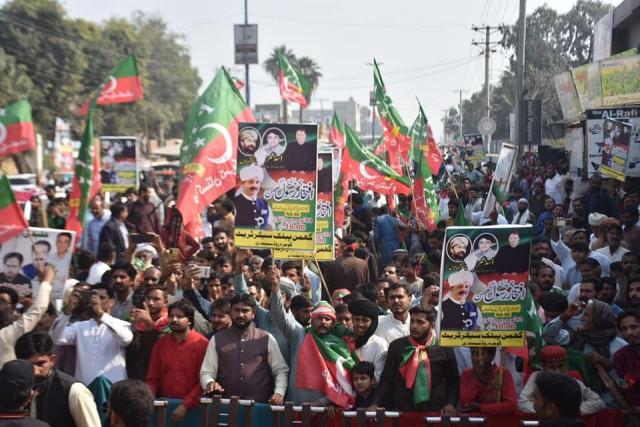PTI told to seek fresh permission for rally
IHC chief justice says everyone has right to hold protest rally without infringing on others' rights

The Islamabad High Court (IHC) on Friday directed the Pakistan Tehreek-e-Insaf (PTI) to submit a fresh plea to the Islamabad Capital Territory (ICT) administration seeking permission to hold a rally in Islamabad.
The court also told the PTI to make sure that the protest rally should not infringe on the fundamental rights of other citizens.
IHC Chief Justice Aamer Farooq heard the PTI’s plea against the delay in the issuance of a no-objection certificate (NOC) for its long march, as well as the traders’ plea against possible road closures owing to the party's long march and possible sit-in.
The Islamabad deputy commissioner and the senior superintendent of police operations also appeared in the court.
At the outset of the hearing, the PTI's counsel told the court that petitioner Ali Nawaz Awan was out of town and unavailable. To this, Additional Attorney General Munawar Duggal replied that his application of November 3 had already become ineffective.
IHC Chief Justice Farooq maintained that the PTI will have to submit a new application to the Islamabad administration, adding that if the problem persisted then a petition could also be filed.
“The cause of action on which the application was initially filed does not exist anymore,” the IHC chief justice said. He further said that the court cannot recommend a venue for a rally and that it was the Islamabad administration’s job to decide where it can be held, whether at D-Chowk or at the F-9 Park.
Read 'Long march a political problem': SC dismisses petition to stop PTI's march
“The rules and regulations and conditions for the rally are to be decided by the administration,” the judge said adding that the Supreme Court had also issued an order in this regard.
The court directed the PTI to inform the administration of the date and time of the rally and then seek permission.
Justice Farooq remarked that these decisions are supposed to be taken by the city administration, the court was only supposed to ensure that matters were resolved as per the law.
The assistant counsel for the PTI informed the court that the application will be submitted to the ICT administration. He requested the court to adjourn the hearing till Tuesday when Babar Awan will himself be able to appear before the court.
During the proceedings, the IHC chief justice inquired about the process of handling a situation if a province did not accept the direction of the federation. “What can the federation then do to control the law-and-order situation?” he asked.
Advocate General Jahangir Jadoon told the court that the federation can call the armed forces under the Constitution.
IHC Chief Justice Farooq said that the matter came up in the Lahore High Court and some directions in this regard were also given.
He maintained that if the PTI assured that the roads will not be blocked then they could hold a protest rally. Referring to the traders' plea, IHC Chief Justice Farooq questioned if the roads had already been blocked.
The chief justice maintained that it was the right of political or non-political parties to protest, however, ordinary citizens and traders also have rights that should not be affected.
“Even in England, people protest in front of 10 Downing Street - the British premier's official residence], but they don't block the road,” Justice Farooq stated.
He said that the high court cannot assume the responsibilities of the deputy commissioner, adding if the PTI is affected by the commissioner's orders then they could approach the court.
AG Jadoon said that the Supreme Court had stated earlier that the long march cannot be stopped. To this, the chief justice, while addressing the PTI lawyer, stated that the party should've acted responsibly and not blocked GT Road, the motorway and other highways.
The court adjourned the hearing on the joint petitions of the PTI and traders till November 22.
Published in The Express Tribune, November 19th, 2022.



















COMMENTS
Comments are moderated and generally will be posted if they are on-topic and not abusive.
For more information, please see our Comments FAQ